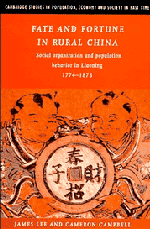Book contents
- Frontmatter
- Contents
- List of figures
- List of maps
- List of tables
- Acknowledgements
- PART 1 DAOYI VILLAGE
- 1 Prologue
- 2 Social organization and social mobility
- 3 Spatial and temporal setting
- PART 2 THE LIAONING DEMOGRAPHIC SYSTEM
- PART 3 HOUSEHOLD ORGANIZATION AND POPULATION BEHAVIOR
- PART 4 BANNER ORGANIZATION AND POPULATION BEHAVIOR
- EPILOGUE: PROSPECTS, IMPLICATIONS, AND COMPARISONS
- Appendices
- Glossary
- References
- Index
- Cambridge Studies in Population, Economy and Society in Past Time
2 - Social organization and social mobility
Published online by Cambridge University Press: 20 October 2009
- Frontmatter
- Contents
- List of figures
- List of maps
- List of tables
- Acknowledgements
- PART 1 DAOYI VILLAGE
- 1 Prologue
- 2 Social organization and social mobility
- 3 Spatial and temporal setting
- PART 2 THE LIAONING DEMOGRAPHIC SYSTEM
- PART 3 HOUSEHOLD ORGANIZATION AND POPULATION BEHAVIOR
- PART 4 BANNER ORGANIZATION AND POPULATION BEHAVIOR
- EPILOGUE: PROSPECTS, IMPLICATIONS, AND COMPARISONS
- Appendices
- Glossary
- References
- Index
- Cambridge Studies in Population, Economy and Society in Past Time
Summary
Sixty years ago, amidst the chaos of warlordism and world war, two of Modern China's most well-known social novelists, Lao She (1899– 1966) and Ba Jin (1904-), sought to identify what feature of Chinese society was most responsible for China's crisis. The answer they produced was contradictory. For Lao She, China's crisis was a product of traditional Chinese “selfish Individualism.” For Ba Jin, the fault lay rather with China's cultural legacy of “subservient Collectivism.”
The reason for their confusion about the nature of Chinese society is that from ancient times, social hierarchy in China has been organized according to two antithetical principles of social mobility: heredity and ability. On the one hand, Chinese believe deeply in ancestral and familial birth rights. On the other hand, Chinese also value strongly individual ability and achievement. Mencius (371–289 BC) recognized the primordial nature of both principles, when he wrote that the two cardinal rules upheld in ancient times by feudal lords were first to protect the familial lines of succession and to punish unfilial sons; and second to praise and to promote talented men.
Both principles were central tenets of the Confucian canon. Confucius (551–478 BC) himself advocated that familial subordination was the foundation of all social and political hierarchy. At the same time he also insisted that the ideal society was one where an intellectual and moral elite should rule; and where access to such education should be open to all. As a result, the Chinese developed two social myths that on the surface seem contradictory. First, they accepted that their individual fate could be beyond their personal control (Lau 1985).
- Type
- Chapter
- Information
- Fate and Fortune in Rural ChinaSocial Organization and Population Behavior in Liaoning 1774–1873, pp. 10 - 26Publisher: Cambridge University PressPrint publication year: 1997

